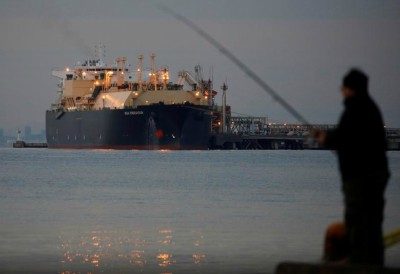Japan's heavyweight LNG buyers wrestle more flexible deals from suppliers
TOKYO (Reuters) -- Japan's LNG buyers are upending the traditional practices of the market, using their leverage as the world's biggest buyers of the fuel to wrestle concessions for more flexible terms.
 |
| Photo Courtesy of Reuters. |
Japan's electric utilities have won provisions that will allow them to divert contracted LNG cargoes if they restart their nuclear reactors, most of which have been shut since the 2011 Fukushima disaster, three sources have told Reuters. This could set a precedent as more contracts start coming up for renewal.
A shrinking population and greater use of alternative fuels has lowered Japan's LNG demand. Because of that, utilities have pushed to gain allowances to resell imported cargoes and reduce their dependence on long-term contracts.
A persistent supply glut and low spot prices have given Japan's utilities the upper hand in their negotiations with sellers. About 32 MMt of annual LNG capacity will come online in 2017, according to a forecast from Reuters Supply Chain and Commodities Research, equal to about 12% of 2016's global imports.
"With competition to place LNG heating up, price is not the only (contract) term under pressure. LNG suppliers will offer more innovative deals to secure sales," said Kerry Anne Shanks, head of LNG research for Asia at Wood Mackenzie. "Japan's power utilities are highly prized as customers."
Japan has traditionally used so-called take-or-pay contracts for LNG purchases that oblige them to pay for a fixed volume of imports, and they are restricted from reselling cargoes if demand drops.
Now, LNG buyers are being offered the restart provisions to entice them to sign up for new contracts, said an executive at one of Japan's gas importers. "This option was offered to us in a recent sales pitch."
These offers come as data from the International Group of Liquefied Natural Gas Importers (GIIGNL) shows that several long-term contracts between Japanese utilities, including Chubu Electric, Tohoku Electric, Shizuoka Gas, and producers including Malaysia's Petronas and Australia's Woodside Petroleum started to expire last year and more will expire in 2017 and 2018.
Many more of the contracts will be coming up for renewal in the coming five years, the GIIGNL data shows.
Neither, the Japanese utilities nor Petronas were available for comment on the ongoing contractual negotiations. Woodside did not comment on the talks.
Even as Asian spot LNG prices have dropped 65% from their 2014 peak, Japan's electric utilities still want to restart their nuclear reactors since they are a lower-cost power generation source.
REACTORS REMAIN SHUT
All but two of Japan's reactors remain shut since the 2011 Fukushima nuclear disaster, and many are going through a relicensing process that is taking longer than expected.
At most, six reactors could restart this year, said Takeo Kikkawa, professor at the Tokyo University of Science, who advised the government on its most recent energy policy, adding the outlook was cloudy for further restarts past that.
The utilities are likely taking advantage of downward quantity tolerances (DQT), standard provisions in gas contracts that stipulate the minimum amount of gas that must be paid for whether the buyer needs it or not, said a Japanese energy executive with more than 20 years of working in the gas business.
Typically, DQTs are set at around 10%, meaning if a buyer signs up for 1 MMt of gas, it must take at least 90% of that on a guaranteed payment basis.
"They are pushing for much greater DQTs," the executive said, adding that owners of older projects would likely offer these options.
"The older projects are fully depreciated. They have been going for many years and they recovered all their costs so their costs basis is low," he said.
In order to maintain market share in an oversupplied market, LNG sellers have become willing to tweak more flexible terms.
"Our production costs a lot of money to develop, and what a buyer calls flexibility, we know as uncertainty," said a commercial manager at a major LNG supplier. "There's already more LNG in the market than is needed, and more is coming, so as a producer we'll have to become that much more flexible in order to remain competitive."
By Aaron Sheldrick and Osamu Tsukimori; Additional reporting by Sonali Paul in MELBOURNE and Emily Chow in KUALA LUMPUR; Editing by Christian Schmollinger

- RWE strengthens partnerships with ADNOC and Masdar to enhance energy security in Germany and Europe
- TotalEnergies and Mozambique announce the full restart of the $20-B Mozambique LNG project
- Venture Global wins LNG arbitration case brought by Spain's Repsol
- Mitsubishi Heavy Industries Compressor acquires Swiss rotating equipment maintenance company AST Turbo AG
- KBR awarded FEED for Coastal Bend LNG project



Comments